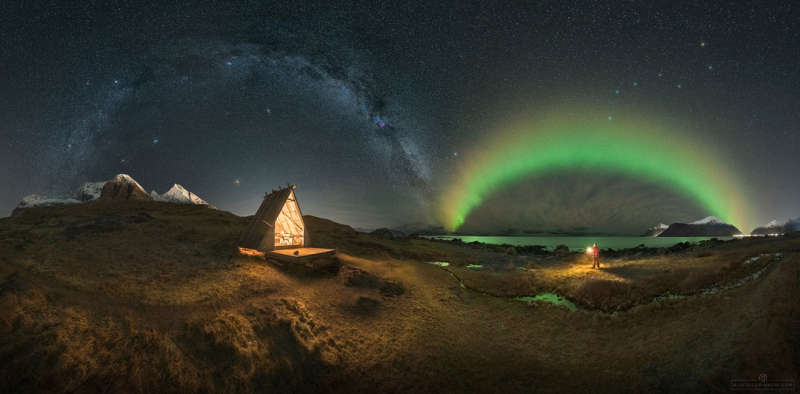Credit & Copyright: Giulio Cobianchi
Explanation:
What are these two giant arches across the sky?
Perhaps the more familiar one, on the left, is the central band of our
Milky Way Galaxy.
This grand disk of stars and nebulas here appears to encircle much of the southern
sky.
Visible below the stellar arch is the
rusty-orange planet
Mars and the extended
Andromeda galaxy.
For a few minutes during this
cold artic night,
a second
giant arch appeared to the right,
encircling part of the northern sky: an
aurora.
Auroras are much closer than stars as they are composed of glowing air high in
Earth's atmosphere.
Visible outside the
green auroral arch is the group of stars popularly
known as the
Big Dipper.
The featured digital composite of 18 images was captured in mid-December over the
in
Norway.
APOD Year in Review (2020):
RJN's Night Sky Network Lecture
1999 2000 2001 2002 2003 2004 2005 2006 2007 2008 2009 2010 2011 2012 2013 2014 2015 2016 2017 2018 2019 2020 2021 2022 2023 2024 2025 2026 |
Yanvar' Fevral' Mart Aprel' Mai Iyun' Iyul' Avgust Sentyabr' Oktyabr' Noyabr' Dekabr' |
NASA Web Site Statements, Warnings, and Disclaimers
NASA Official: Jay Norris. Specific rights apply.
A service of: LHEA at NASA / GSFC
& Michigan Tech. U.
|
Publikacii s klyuchevymi slovami:
Milky Way - aurora - Mlechnyi Put' - severnoe siyanie
Publikacii so slovami: Milky Way - aurora - Mlechnyi Put' - severnoe siyanie | |
Sm. takzhe:
Vse publikacii na tu zhe temu >> | |
